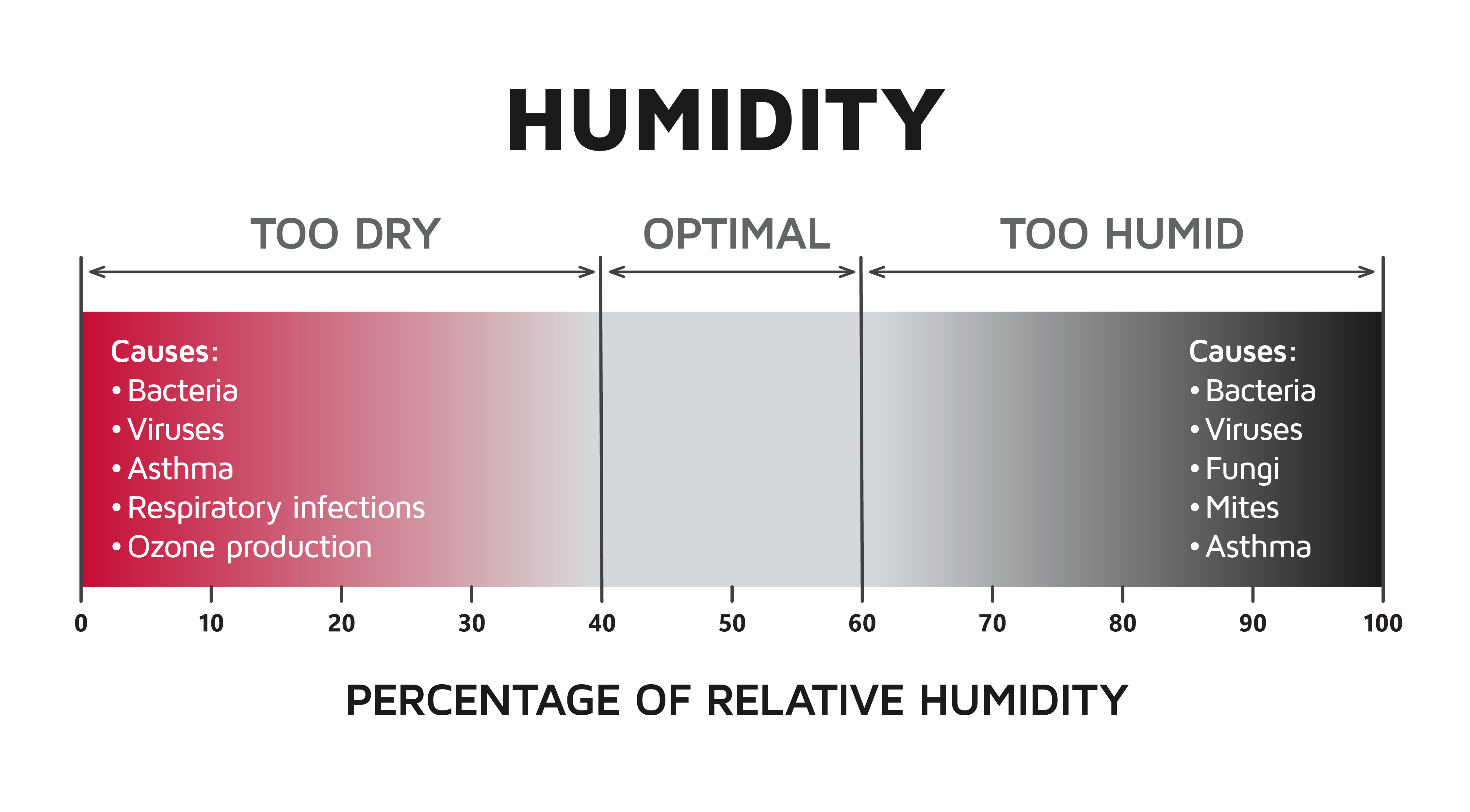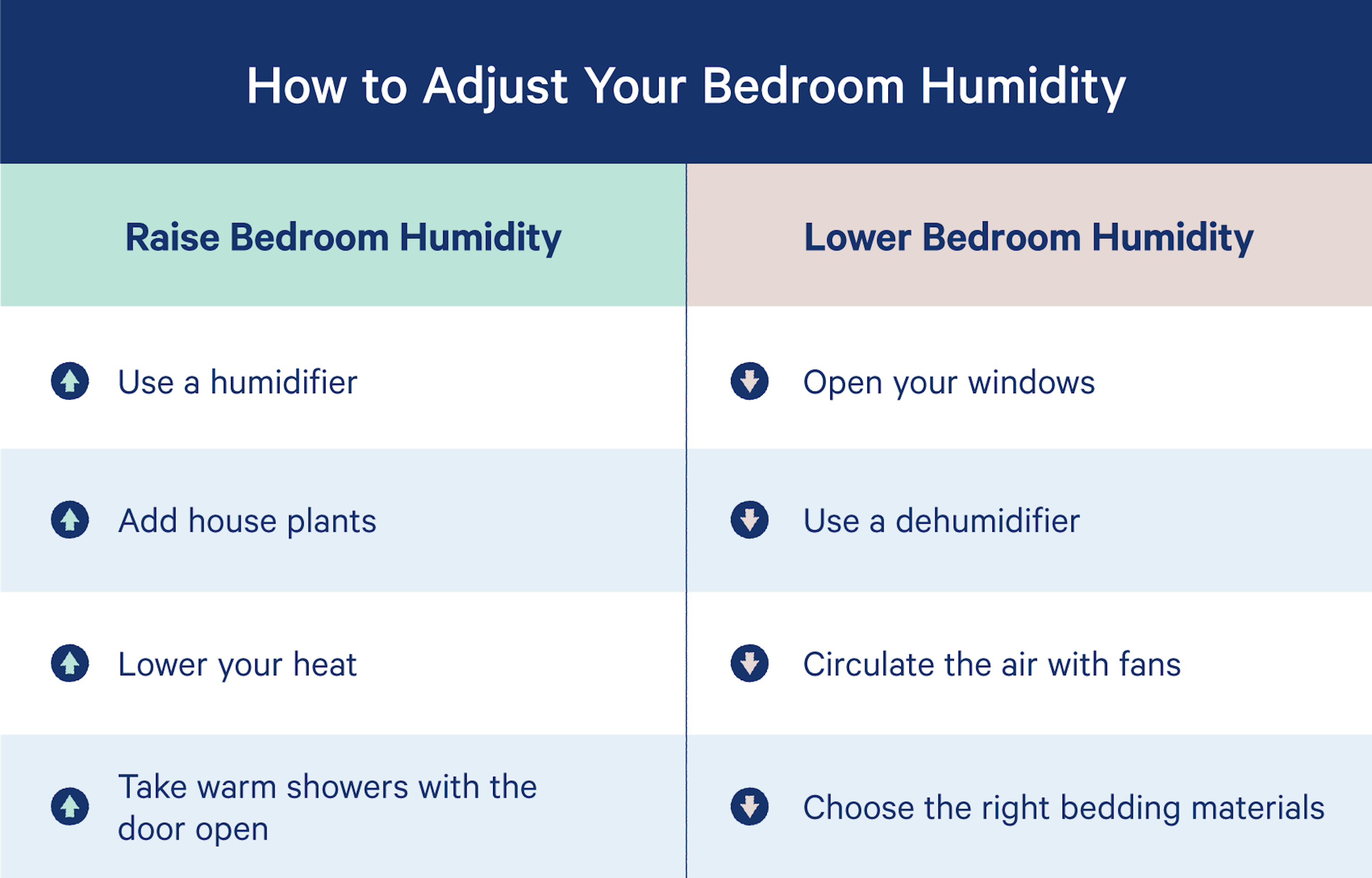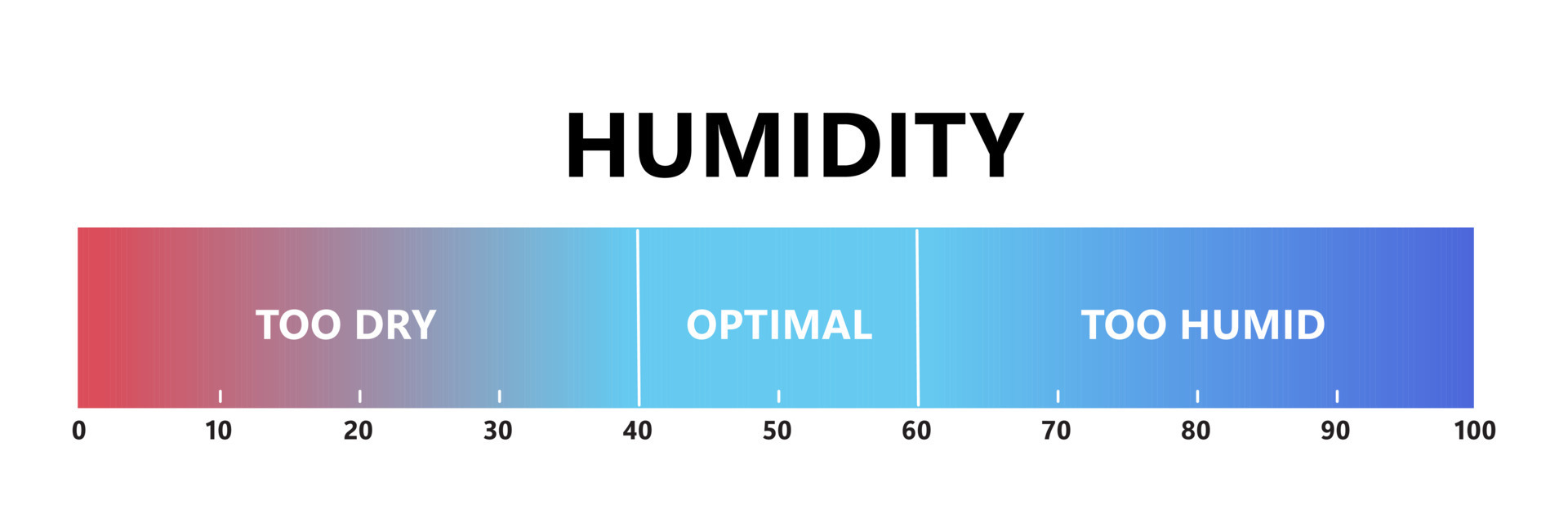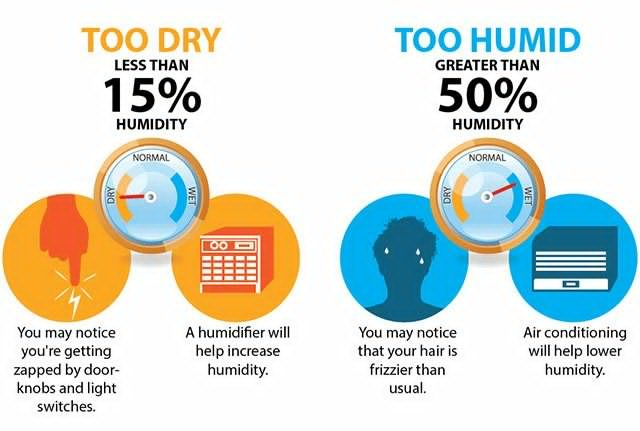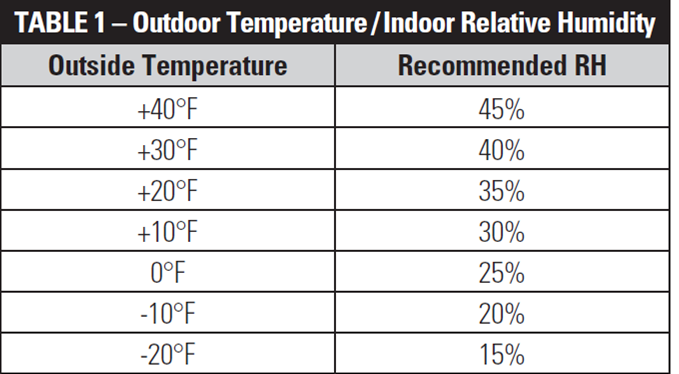What's A Good Humidity Level For Bedroom
.jpg?width=3508&name=Humidity level chart (1).jpg)
Maintaining the right humidity level in your bedroom is crucial for a comfortable and healthy sleep environment. Too much humidity can lead to mold growth and respiratory problems, while too little can cause dry skin, irritated sinuses, and even nosebleeds. Finding the sweet spot is essential for a good night's rest and overall well-being.
Understanding Humidity and Its Impact on Your Bedroom
Humidity refers to the amount of moisture in the air. It's measured as relative humidity, which is the percentage of moisture in the air compared to the maximum amount of moisture the air can hold at a given temperature. The ideal relative humidity level for a bedroom typically falls between 30% and 50%.
The Dangers of High Humidity
When humidity levels rise above 60%, several problems can arise:
- Mold and Mildew Growth: Damp environments are breeding grounds for mold and mildew, which can trigger allergies, asthma, and other respiratory issues.
- Dust Mite Infestation: Dust mites thrive in humid conditions, exacerbating allergy symptoms.
- Uncomfortable Sleep: High humidity makes the air feel heavy and sticky, making it difficult to fall asleep and stay asleep.
- Damage to Belongings: Excessive moisture can damage furniture, clothing, and other items in your bedroom.
The Downsides of Low Humidity
Conversely, humidity levels below 30% can also be detrimental:
- Dry Skin and Irritated Eyes: Low humidity can strip moisture from your skin and eyes, leading to dryness, itching, and irritation.
- Respiratory Problems: Dry air can irritate your nasal passages and throat, increasing your susceptibility to colds and other respiratory infections.
- Static Electricity: Low humidity promotes static electricity, which can be annoying and even damaging to electronics.
- Cracked Wood Furniture: Dry air can cause wooden furniture to crack and warp.
How to Measure Humidity Levels in Your Bedroom
The easiest way to measure humidity is with a hygrometer, also known as a humidity monitor. These devices are relatively inexpensive and readily available at most hardware stores and online retailers. Digital hygrometers are generally more accurate than analog models. Place the hygrometer in a central location in your bedroom, away from direct sunlight or drafts, to get an accurate reading.
Maintaining Optimal Humidity: HVAC Systems and Solutions
Several strategies can help you maintain the ideal humidity level in your bedroom. Your HVAC system plays a crucial role.
HVAC Systems and Humidity Control
Modern HVAC systems often include features to help regulate humidity. Here's a look at how different systems can impact humidity levels:
- Air Conditioners: Air conditioners naturally dehumidify the air as they cool. The cold evaporator coil condenses moisture, which is then drained away. Look for AC units with adjustable fan speeds, as lower fan speeds can enhance dehumidification. SEER (Seasonal Energy Efficiency Ratio) ratings indicate the unit's cooling efficiency; higher SEER ratings generally mean better energy savings.
- Heat Pumps: Heat pumps work similarly to air conditioners in cooling mode, providing dehumidification. However, in heating mode, they don't dehumidify. Look for heat pumps with high HSPF (Heating Seasonal Performance Factor) ratings for efficient heating.
- Furnaces: Furnaces do not dehumidify the air. In fact, they can sometimes dry it out, especially in cold climates.
- Whole-House Dehumidifiers: These systems are integrated into your HVAC system and can effectively remove excess moisture from your entire home. They are a great option for homes with consistently high humidity levels.
- Whole-House Humidifiers: These systems add moisture to the air, which is beneficial in dry climates or during the winter months when heating systems can dry out the air.
Portable Dehumidifiers and Humidifiers
If you don't want to invest in a whole-house system, portable dehumidifiers and humidifiers can be effective for individual rooms like your bedroom.
- Portable Dehumidifiers: These units draw in air, remove moisture, and then release the dry air back into the room. Choose a dehumidifier with a capacity that's appropriate for the size of your bedroom. Look for features like automatic shut-off and adjustable humidity settings.
- Portable Humidifiers: These units add moisture to the air through various methods, such as evaporative, ultrasonic, or steam. Consider the type of humidifier that best suits your needs and preferences. Evaporative humidifiers are generally quieter and use less energy, while ultrasonic humidifiers are very quiet and can produce a cool mist. Steam humidifiers can be effective but can also be a burn hazard, especially for children.
Other Strategies for Humidity Control
In addition to HVAC systems and portable units, here are some other strategies you can use to manage humidity in your bedroom:
- Ventilation: Ensure adequate ventilation in your bedroom by opening windows or using exhaust fans, especially after showering or bathing.
- Fix Leaks: Repair any leaks in your roof, walls, or plumbing to prevent moisture from entering your bedroom.
- Use Absorbent Materials: Place moisture-absorbing materials like silica gel packs or charcoal filters in your closet or drawers to help absorb excess humidity.
- Proper Ventilation in Bathrooms: Always use the exhaust fan in the bathroom during and after showers or baths to prevent moisture from spreading to other rooms.
- Avoid Overwatering Plants: Overwatering indoor plants can contribute to higher humidity levels.
Popular HVAC Brands and Models for Humidity Control
When choosing an HVAC system, consider brands known for their humidity control features. Some popular options include:
- Carrier: Carrier offers a range of air conditioners and heat pumps with advanced humidity control features, such as their Infinity series.
- Trane: Trane's TruComfort systems are designed to maintain consistent temperatures and humidity levels.
- Lennox: Lennox offers a variety of energy-efficient HVAC systems with options for whole-house dehumidification.
- Aprilaire: Aprilaire specializes in indoor air quality solutions, including whole-house dehumidifiers and humidifiers.
When comparing models, pay attention to AFUE (Annual Fuel Utilization Efficiency) ratings for furnaces and SEER and HSPF ratings for air conditioners and heat pumps. Higher ratings indicate greater energy efficiency, which can save you money on your energy bills.
Warranty and Maintenance Considerations
Before purchasing an HVAC system, carefully review the warranty terms. Most manufacturers offer warranties on parts and labor, but the duration and coverage can vary. Regular maintenance is essential to keep your HVAC system running efficiently and prevent problems. Schedule annual tune-ups with a qualified HVAC technician to ensure your system is operating properly and to identify any potential issues before they become major problems. Cleaning or replacing air filters regularly is also crucial for maintaining good air quality and system performance.
Cost Considerations
The cost of an HVAC system can vary depending on the type of system, its size, and its features. Portable dehumidifiers and humidifiers are generally the most affordable option, while whole-house systems can be a significant investment. When comparing costs, consider the long-term energy savings associated with more efficient models. Also, factor in the cost of installation, maintenance, and repairs.
Making the Right Choice for Your Bedroom
Maintaining the right humidity level in your bedroom is essential for a comfortable and healthy sleep environment. By understanding the impact of humidity, measuring humidity levels, and implementing appropriate strategies, you can create a bedroom that promotes restful sleep and overall well-being. Whether you choose to invest in a whole-house HVAC system, a portable dehumidifier or humidifier, or a combination of strategies, take the time to find the solution that best meets your needs and budget.
